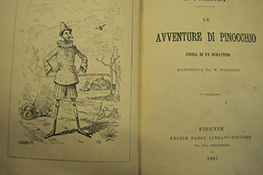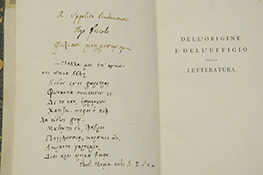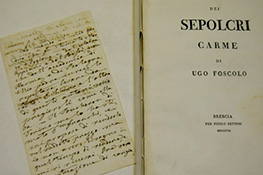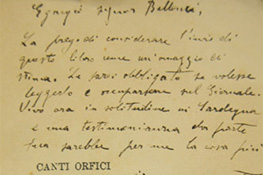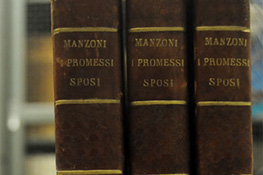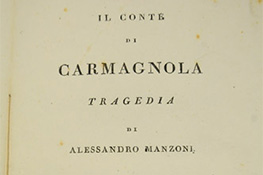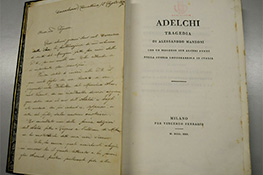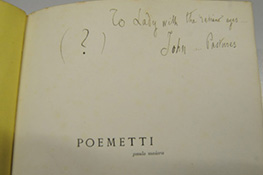Versione italiana English version Version française Versión en español
Index First editions Manzoni's collections Bibliophile's works Letters and photographs
Inside the conspicuous and articulated Parenti Fund there is an exceptional collection of first editions, rare books and unique specimens that bear autographed dedications of the illustrious authors or contain precious attachments. Here we report some of the most valuable specimens.
The adventures of Pinocchio
Precious first edition of the book by Carlo Collodi, with the famous illustrations by Enrico Mazzanti, printed in Florence in 1883 by Felice Paggi. It is one of the rarest pieces of the Italian nineteenth century, very sought after, so much so that the Resto del Carlino of 17th December 1942 gave this news: "Precious specimen of Pinocchio found in a Reggio bookshop.
America and Walt Disney were anxiously looking for the I edition of the famous book of Collodi": the interest was also for Mazzanti's drawings, which the cartoon intended to be inspired by.
The rare volume was part of a lot given by a priest to the bookstore from which the Parenti bought it.
Foscolian autograph
Among the materials of the Fund we find the first edition of the work by Foscolo Dell'origine e dell'ufficio della letteratura , published at the Stamperia Reale in Milan in 1809.
It is a passionate prayer on the importance of the word, in which all the main elements of Foscolo's poetry are found.
The author read it on 22nd January 1809 at the inaugural lecture of the course that he was called to give at the University of Pavia.
On the volume we note his autograph dedication to Ippolito Pindemonte, with verses in Greek taken from the Olympic Games of Pindar.
A note from Parenti informs us that this edition was composed under the eyes of Foscolo himself.
The Sepolcri
Also the famous Foscolian carme Dei Sepocri is represented by the first edition of Brescia in 1807, for the types of Nicolò Bettoni.
The copy in possession of the Library contains a sheet with a note on Maddalena Bignami, one of the three Graces of Foscolo, which we report here: "3 women who are the Nencini Fiorentina, the Martinotti Bolognese and the Bignami Milanese.
It assigns to the first the graces that breathe from a tempered soul of sweet piety, and it symbolizes it in the affections of the music; to the second the graces of the fantasy expressed from the amiability of the words; and to the third the apparent graces to the look from the elegance of the forms in the motions of the dance".
It is also attached a letter from the same Bignami such Corticelli at the hotel of San Marco in Bologna, dealing with the sending of a picture with intention of sale.
The orphic songs of Dino Campana
We know the vicissitudes of the manuscript of the Canti orfici by Dino Campana, lost in 1913 and then found among the papers of Ardengo Soffici in 1971, rewritten by the author on the basis of his own memories and notes and as such published in Marradi by the printing Ravagli in 1914, thanks to the subscription of 44 fellow citizens who each paid 110 lire.
A rare example of this first edition is found among the materials of the Fund. Also in this case the author has torn the dedication to the Emperor Wilhelm of Germany and abraded the subtitle of the title that bore these words: Die Tragödie des letzen Germanen in Italien (The tragedy of the last German in Italy).
On the right of the eyelet appears instead a dedication of the same Bell to the critic Goffredo Bellonci, with request for review: "Dear Mr Bellonci, please consider the sending of this book as a tribute of esteem. I'd be obliged if you'd read it and take care of it in the paper. I live now in solitude in Sardinia and a testimony from Him would be for me the most grateful and most encouraging thing in my not small miseries. Forgive these de profundis and want to believe me of you devoted Dino Campana".
Manzoni: la ventisettana dei Promessi Sposi
A long gestation, which lasted from 1822 to 1824, led Manzoni, through the interesting experiment of Fermo and Lucia and the subsequent Brogliaccio degli Sposi Promessi , to the first draft of the Promessi Sposi published by the publisher Ferrario in Milan between 1825 and 1827, according to the scan of the three tomes of which it is composed.
Known among scholars as the twenty-seven, from the year of publication, as is well known left unsatisfied the author who judged the language used impure grain and too colored by lombardism, so as to lead him to the choice of the Florentine stay (in 1827), for the purpose of "rinse clothes in the Arno".
The linguistic revision, conducted on the unifying Tuscan model, generated between 1840 and 1842 the second and final edition, called "quarantana", which is the one normally adopted in schools and to which reference is made today.
In the Family Fund we find an example of the ventisettana.
Manzoni: Il Conte di Carmagnola
Also at the Ferrario printing works in Milan, in 1820, the first edition of the tragedy "Il Conte di Carmagnola" was published, another bibliographical rarity in the Parenti's collection.
Dedicated to Fauriel, the work as it is known is preceded by a preface in which Manzoni exposes his poetics contesting the classical units of time and place, and explains the function attributed to the Chorus, which is not the collective character of the Greek tragedy, but it is a lyrical interpretation in which the author can make his voice heard.
Manzoni: l'Adelchi
This first edition of Manzoni's tragedy dedicated to the events preceding the fall of the Lombard kingdom between 772 and 774, with the fundamental theme of the opposition between oppressed and oppressors, published by Ferrario in Milan in 1822, is embellished by an autograph of the author and a letter, dated 1887, of this Aniceto Giardini which attaches a sheet that says found in the library of the Marquis Arconati Visconti, containing 12 verses of "Adelchi" suppressed by Austrian censorship.
Pascoli's poems
It's the second edition (1900) of the "Poemetti Pascoliani", "Georgic novel" according to the Giorgio Bàrberi Squarotti critique, but also close to European decadence.
Compared to the first edition of 1897, this second edition is more than doubled (45 texts in all compared to the 20 of the edition of '97).
On the specimen in possession of the Historical Library, there is an autograph dedication of the poet to a friend. Pascoli addressed her in English: "To Lady with the radiant eyes..." and signed her name: "John... Pastures".

